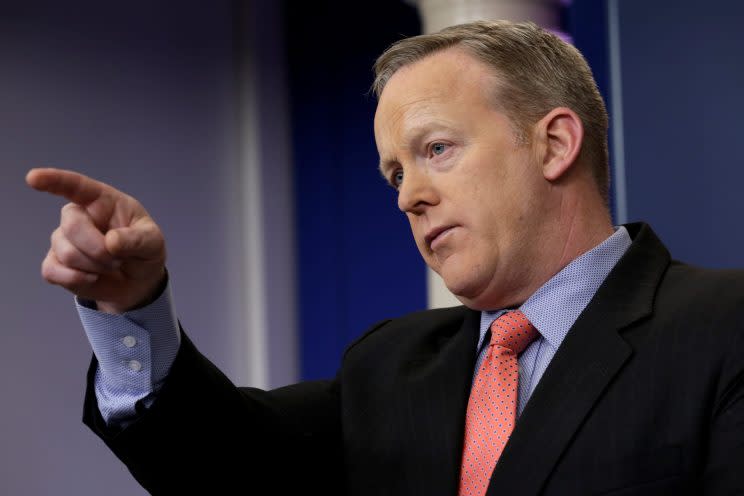White House fights back against calling Trump’s order on immigration a ‘Muslim ban’
During a briefing Tuesday, White House Press Secretary Sean Spicer disputed the notion that President Trump’s executive order halting immigration from seven predominantly Muslim countries constitutes a “ban.”
Yahoo News asked Spicer about comments Mayor Rudy Giuliani made in a Fox News interview last Saturday, in which he suggested that the order evolved out of Trump’s campaign promise to impose a “Muslim ban.” Spicer argued that the order does not constitute “a Muslim ban” or a “travel ban.”
“I think the president has talked about extreme vetting and the need to keep America safe for a very, very long time. At the same time, he’s also made very clear that this is not a Muslim ban. It’s not a travel ban. It’s a vetting system to keep America safe. That’s it plain and simple, and all of the facts, and a reading of it, clearly show that that’s what it is,” Spicer said.
Yahoo News pointed out that Giuliani did not say the ban was based on religion, but instead suggested that it arose as a result of a desire for a Muslim ban.
“Then you should ask Mayor Giuliani,” Spicer replied. “That’s — that’s his opinion. I’m just telling you what the president has said, and what the president has done has been to focus on making sure that we keep the country safe and that the executive order that was drafted does just that.”
The order, which Trump signed last Friday afternoon, stopped people from Sudan, Syria, Yemen, Iran, Iraq, Libya and Somalia from entering the United States for 90 days. It also barred all refugees from entering the United States for 120 days and indefinitely suspended the entry of refugees from Syria. The order caused some people with current visas to be detained and led to widespread protests and legal challenges.
During his presidential bid, Trump called for a “total and complete shutdown of Muslims” entering the U.S. That proposal subsequently evolved into a vague promise to impose “extreme vetting.” In his Fox News interview, Giuliani said Trump approached him to find a legal way to implement a “Muslim ban.”
“I’ll tell you the whole history of it: When he first announced it, he said ‘Muslim ban,'” Giuliani said.
Giuliani went on to claim that Trump had asked him to form a commission to discuss the policy.
“He called me up, he said, ‘Put a commission together, show me the right way to do it legally,’” said the mayor.
Giuliani said he had assembled a group that “focused on, instead of religion, danger.” He stressed that the policy it settled on was “not based on religion” and called it “perfectly legal, perfectly sensible.”
“It’s based on places where there are substantial evidence that people are sending terrorists into our country,” he said.
Yahoo News followed Spicer’s advice and reached out to a spokeswoman for Giuliani, Jo Ann Zafonte, to ask about the mayor’s comments.
“I’m sorry, the mayor is not available,” she said.

In the briefing, Spicer stressed to Yahoo News that the seven countries affected by the order had already had restrictions placed on them during the administration of President Barack Obama. Specifically, people traveling from those countries, or who had recently visited them, were deemed ineligible for the “visa waiver” program, and had to apply for a visa to enter the U.S. But they were not excluded altogether.
“It is … to make sure and to ensure that people coming in from seven countries identified by the Obama administration [where] we didn’t have the proper systems, to know who was coming into our country,” Spicer said, later adding, “A 90-day period was also granted to ensure that we knew how to further address vetting situations in the future.”
Despite Spicer’s contention that the order is not “a ban,” he and Trump have both used this language in the past. Spicer referred to it as a “90-day ban” in an appearance on ABC’s “This Week” on Sunday that was subsequently touted in a White House press release. Trump himself described the order as a “ban” in a tweet he sent on Monday, in which he defended the fact that it was announced without warning, as a necessary step to ensure “bad ‘dudes’” did not “rush into our country” before it took effect.
During the briefing, NBC News’ Kristen Welker read Trump’s tweet and asked Spicer how he could deny that the order was a “ban” if the president was using that language to describe it. Spicer argued that Trump is “using the words that the media is using,” which prompted an incredulous response from another reporter in the briefing room.
“Those are his words!” the reporter exclaimed.
Spicer went on to argue that the U.S. is still admitting large numbers of visitors into the country.
“It can’t be a ban if you’re letting a million people in … that is by nature not a ban. It is extreme vetting,” Spicer said.
In recent years, the total number of foreign visitors to the U.S., including those from Canada and Mexico, has been around 6 million a month.
Spicer concluded by repeating his claim that the media was responsible for the order being described as a ban.
“I think that the words that are being used to describe it derive from what the media is calling this. He has been very clear that it is extreme vetting,” he said.


